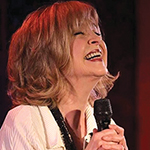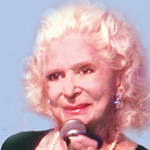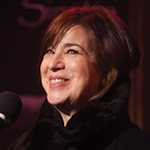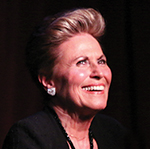Frank Holder
Nobody’s Fool
By Helen Theophanous for Cabaret Scenes
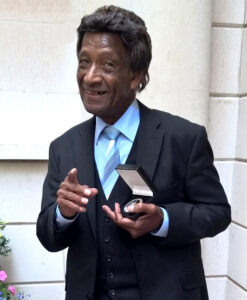
On April 2, 1925 Frank Holder was born in Guyana and now jokes that he always thanked his mother for not delivering him to the world on April Fool’s Day!
Frank was no fool and to this day, at 91 years young, enjoys performing in London where he moved at the age of 19 to join the Royal Air Force and where he subsequently made his home and became the resident vocalist with the John Dankworth Seven. He has been singing for most of his life all over the world, including performances at the Proms at London’s Royal Albert Hall.
His photograph albums almost serve as a history of popular music from jazz in the 1940s to rock and roll, pop and cabaret. Frank Holder is unique.
In 2014 he was awarded a lifetime achievement award from the Worshipful Company of Musicians and celebrated his 90th birthday with two one-hour sets at Ronnie Scott’s Club London with his band. Touring the world, he has worked with the best, notably being admired by Ella Fitzgerald who, when in the audience having dinner, put down her knife and fork to listen when she heard Frank sing.
I have been to many of Frank’s concerts in recent years and have been captivated by the youthful, mellow quality of his voice and his improvisational skills and, of course, his unfailingly magnetic effect on the audience. Knowing where to begin with a career as long as his was a daunting, but exciting, challenge. I met him and his wife Irene in their home in Surrey.
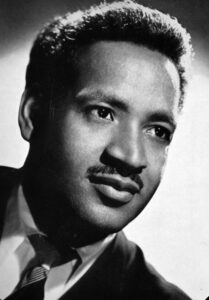
Helen Theophanous As a young man, who inspired you to become a singer?
Frank Holder: Oh, well, people like Paul Robeson and my good friend Billy Eckstine. In fact, when I eventually met Billy, we were on the same bill, and he paid me a great compliment. He said, “Oh, man, you are such a hard act to follow.” I told him it was because of him inspiring me that I worked so hard. I listened to the best and the they way they sang and how they put their emotions into the song and I tried to create something for myself. I don’t just sing to entertain. I put all of myself into what I’m doing to give everything to the audience and, I must say, it has worked for me. If you believe and have a vision that can drive you, you can do so much. There are so many who inspired me. People even before Billy Eckstine—so many I can’t remember.
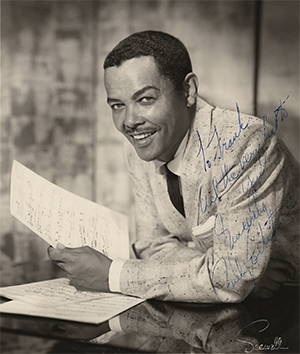
HT: What was your vision: To work with a particular band or be on a particular stage?
FH: No. To be on ANY stage! To be the best I could be. I was so full of it. My mother would tell me to stop, but my father would say, “Leave the boy alone.” There was music all around. My late older brother had a wonderful classical voice, but he didn’t have what I have. He was great, but I did both. I got so much more from being able to sit with the guys and swing and phrase a song. It was a great inspiration for me. It’s such a wonderful journey. Sometimes I can’t believe I’ve done so many things and worked with such great people.
HT: Did you have a musical education in Guyana?
FH: No. I never had the opportunity. But my mother liked to sing and my brother and I sang in church. My father used to book bands, so I was very lucky to always be around bands from an early age, listening and learning, and I had a great desire to sing with a band. I listened to good singers and had the ambition to be as good or better than them. That was my musical education.
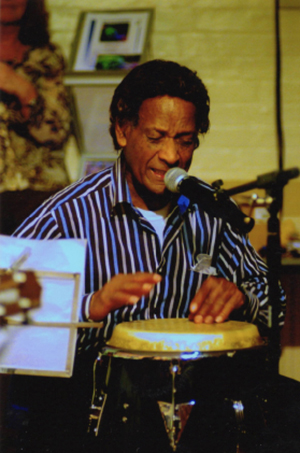 HT: Did you work with many bands?
HT: Did you work with many bands?
FH: I have been fortunate to do that because of my dad, and my own association with bookers too, which gave me an introduction even from my early days in Guyana. As I said, my dad was in the business and he booked many bands. He loved music although he couldn’t really sing. My brother and I were so fortunate to sing with the best bands. Later, of course, I worked with famous bands in England.
HT: Did you ever suffer from nerves?
FH: I’m lucky, really. I was always very confident and never nervous. I just loved performing. In fact, I was asked by the great singer Matt Monro to help him get over his nerves, because he came to performing in later life when he was discovered. I also taught Dame Shirley Bassey vocal technique in the early days and she’s done pretty well! As a kid I was encouraged to go out there and give it everything. Consequently, that attitude has stayed with me. I feel no matter what the situation—anything to do with performing—I’m going out there and I’m going to give it one more. I’m doing it first for me. Secondly, I feel so good about myself that I want to impress people with what I do and be the best. I like to communicate with every member of the audience and really reach them.
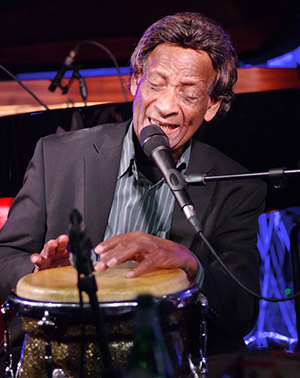 HT: Do you think, in your time, the black jazz singers who had big careers in London were not given full credit in the same way as the black American singers in the USA?
HT: Do you think, in your time, the black jazz singers who had big careers in London were not given full credit in the same way as the black American singers in the USA?
FH: That is true. I don’t think we were promoted in the same way as in the USA. Ronnie Scott never booked me, although I do sing at the club now to a full house. Some people thought I was dead! But, you know it was difficult to get on the same bill as some artists such as Lonnie Donegan, Alma Cogan and others. They said they didn’t want me on the same bill as they didn’t want to follow me! In Africa, Eartha Kitt was in tears because she didn’t want to go on stage after me. I told her to tell herself she was going out there and would show them she could wipe the floor with that Frank Holder.
HT: Did you ever face any racial discrimination?
FH: On one occasion in the 1940s the Leslie “Jiver” Hutchinson band had pre-booked the band into a hotel, but when we arrived and the manager saw me, he said all the band could register, except for “that one,” pointing at me. So, the whole band picked up their bags and left. Another time the bandleader would appeal to the audience and ask, “Have you had a good time? Did you enjoy the show?” He then said we hadn’t anywhere to stay that night and the audience offered us their homes gladly and put us up, which was really marvelous.
HT: You are also a songwriter. Would you like to write more?
FH: Yes, I have written a few [songs], but I just don’t get ‘round to it. I wrote a lovely song for my wife Irene which is on one of my my CDs. Irene is a great support to me and she believes in me. She arranges everything and I don’t need to worry about a thing because it’s all taken care of. We have been together for 60 years now. It’s amazing, we are like one person. We think and feel alike and we just gel so well. When I stop and think about it, it’s something we take for granted, but we are there for each other. Apart from little squabbles over Irene wanting the text on the TV, we never really quarrel.
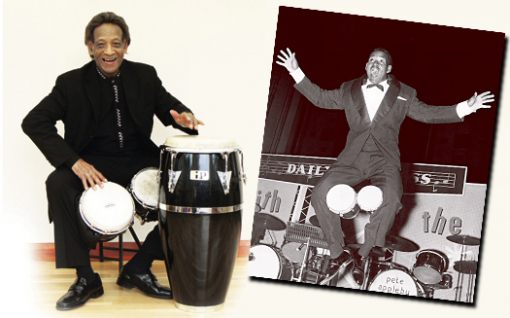 HT: In the early days I know you used to jump in the air with the bongos between your knees. Have you always played bongos and congas?
HT: In the early days I know you used to jump in the air with the bongos between your knees. Have you always played bongos and congas?
FH: I decided to teach myself the congas because, when I was on stage with the John Dankworth band, there were times when I was not singing. So, I thought instead of just standing there, I needed to be doing something, playing an instrument. So I chose the congas and thought I could join in with the band when I was not singing. Having decided to do it, I wanted to be the best. I was full of it. I was crazy about playing. No one played congas here. You couldn’t even buy congas here. So I sent for some conga LPs from America and listened and taught myself and created my own thing. I was obsessed with being the best and wanted to do something no one else was doing. Now I always play the congas when I am performing.
HT: You also play the drums because I saw you take over from your drummer at Ronnie Scott’s on your 90th birthday gig and it brought the house down!
FH: Yes, but I taught myself drums, too.
HT: When in your long career do you feel was the most successful or enjoyable time?
FH: It’s so difficult to say because I have worked with such marvelous people. The time I spent with Leslie “Jiver” Hutchinson stays in the mind as a wonderful time. “Jiver” was the father of the singer Elaine Delmar. Lesley “Jiver” Hutchinson—a lovely very quiet nice guy. Being with a band like that did a lot for me. He gave me freedom and I could choose what I wanted to do and they did orchestrations around me. It was a very important time for me and helped me to develop my own style. But, later, working with John Dankworth and the Dankworth Seven was pretty amazing, too.
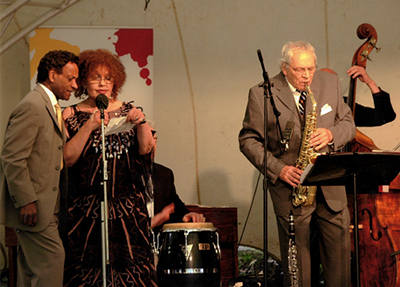
HT: You were with the Dankworth Seven before Cleo Laine joined the band. Do you remember her joining?
FH: Oh, of course. Cleo auditioned and John asked me what I thought. Cleo was quite young and inexperienced, but I could see she had talent. So John asked me to take her under my wing and to teach her all I knew.
HT: What did you teach her?
FH: Well, everything about being on stage, from what to wear to microphone technique.
HT: Did you tour much?
FH: We traveled a lot. All over the world and a lot of African countries, including Nigeria, Ghana, Botswana and South Africa. In Chile there was a civil war going on, but we performed. Unfortunately, we never got to the USA.
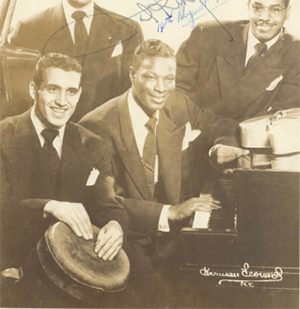
HT: Of the many great jazz musicians you worked with, do you have any special memories?
FH: Too many to remember. But I was great friends with Billy Eckstine. He was a very handsome guy and I had to watch him when he flirted with my beautiful wife Irene! I also knew Nat King Cole, whom I admired tremendously. I was on the same bill as him at the Royal Albert Hall with John Dankworth’s band. I met so many great musicians and worked with Dizzy Gillespie and many more. At the Talk of The Town Newcastle on Tyne I worked in cabaret with stars such as Sandie Shaw, Tom Jones, Dusty Springfield and Madeline Bell.
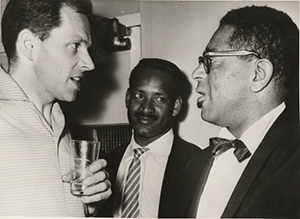
HT: You were very keen on sports as a young man. Do you think this has helped you to keep so fit now?
FH: Definitely. I was a boxer with the RAF. Once I was knocked down and it affected a nerve on one side of my mouth, so now I can’t whistle. I didn’t box after that. The world heavyweight champion boxer Joe Louis was a great friend of mine. I was very keen on all sports, such as running and I was on the showbiz cricket team. One time I was appearing in the Isle of Man off the coast of the U.K., with the John Dankworth band and John put my name down for the Mr. Isle of Man competition because I was keen on bodybuilding and very fit. I won it!
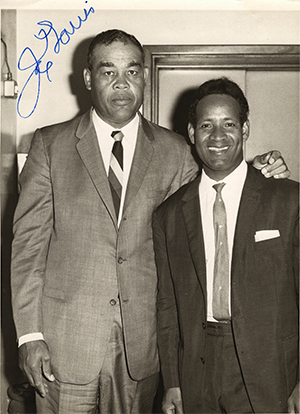
HT: I notice when you are on stage you have great energy and act almost as the bandleader alongside your MD.
FH: I like to inject my energy into the proceedings and I work with great musicians who know what I want to do and how to give my best to the audience. I really have a strong desire to please the audience and to communicate directly with them. I love their applause and appreciation. It is just marvelous.
HT: Do you have any unfulfilled ambitions?
FH: Well, I would have loved to act, but I never had the opportunity. I did sing the title track for the film Nor the Moon by Night. The film people in Australia contacted the 606 Club in London to find me. I was in Cry the Beloved Country. I did do radio with “Jazz Line-Up” on the BBC. But I would love to do a tearaway gig and do something monstrous, you know, wild improvisation.
HT: You worked through the era of bebop in the late ‘40s.
FH: I picked it up from records and I was always near a band listening and scatting. It’s so simple. You know the melody line and, if you are clever enough, you harmonize. Then you try to be an orchestral instrument and try to do what the saxophonist is doing by changing the rhythmic pattern. And, at the same time, you hear the chord changes. I sing chord changes. I can hear every chord and, in fact, some musicians were surprised when I suggested trying a different a chord. I would even sing it to them. It actually amazes me that I can do this. It’s what I happened to develop because I did not have the opportunity to study or get into certain groups where I could learn. It was developed by my desire to be part of the orchestra. I hear all the orchestra parts in every song. I can hear the changes. The difference between myself and other singers is that they will learn a tune, but I’m hearing changes and can hear without even rehearsing. It all started when my dad was promoting bands and when I was with the Lesley “Jiver” Hutchinson band in the early days.
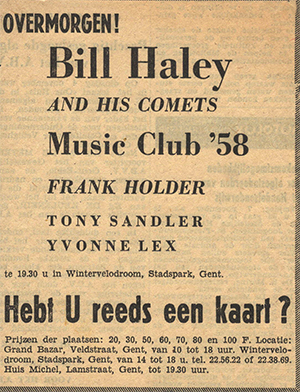 HT: Have you seen much change in the business since the 1940s?
HT: Have you seen much change in the business since the 1940s?
FH: I suppose the main thing is that there are not so many venues playing jazz. In the ‘50s jazz was the music and it was quite glamorous.
canadian pharmacy https://gaetzpharmacy.com no prescription
The whole band used to dress sharp. I used to change my clothes each time I appeared during the show. Singers like Lena Horne were always so glamorous, too.
HT: Did rock and roll affect your career?
FH. No because I also worked with Bill Haley and the Comets in Germany in the rock and roll era. I joined in and I did a few gigs with Bill. I wanted to prove I could do anything—whether it was singing a nice ballad, doing jazz or rock and roll. It filled with me with great joy to entertain. I loved to do the top songs of the day in whatever style. Recently, I recorded some songs by George Michael, including “Careless Whisper” with Shane Hill on guitar. The reviewer said he had never liked the songs before but did when I sang them and made them my own. I’ve been fortunate. Singing is the only thing I wanted to do and what I was good at. I did so many things and I had the time of my life. I couldn’t believe what was happening to me. I was doing big concerts and topping the bill. I just couldn’t believe it. It’s been marvelous.
HT: What is in your diary now Frank?
FH: I’m doing gigs with pianist Geoff Castle, Shane Hill on guitar, Val Mannix on bass and Les Cirkel on drums. We played at Ronnie Scott’s recently and more dates are planned for the future.
My interview ended with Frank demonstrating bebop to me using “Three Blind Mice,” which would not have been out of place in the Royal Albert Hall!
Editor’s Note: Visit FrankHolderMusic.com
Future gigs
Ropetackle Arts Centre Sunday 5th March 2017 as special guest of Mike Hatchard http://ropetacklecentre.co.uk/events/jazz-breakfast-with mikehatchard-march/
Hawth Theatre Crawley Sunday 19th March 2017 Frank Holder Quartet
http://www.parkwoodtheatres.co.uk/The-Hawth/Shows/53be3535-c2b8-e611-
80e1-e90aaf3ba07/frank-holder
Queens Theatre, Hornchurch Friday 24th March 2017


